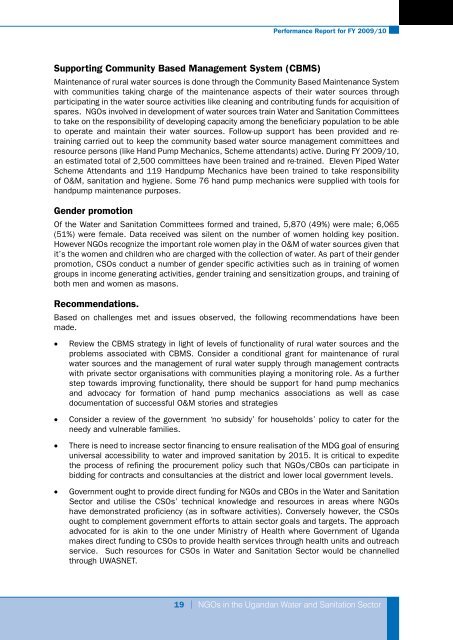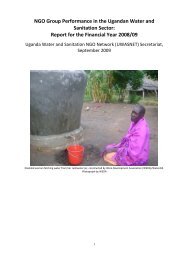Performance Report for FY 2009/10 - UWASNET
Performance Report for FY 2009/10 - UWASNET
Performance Report for FY 2009/10 - UWASNET
Create successful ePaper yourself
Turn your PDF publications into a flip-book with our unique Google optimized e-Paper software.
Supporting Community Based Management System (CBMS)<br />
<strong>Per<strong>for</strong>mance</strong> <strong>Report</strong> <strong>for</strong> <strong>FY</strong> <strong>2009</strong>/<strong>10</strong><br />
Maintenance of rural water sources is done through the Community Based Maintenance System<br />
with communities taking charge of the maintenance aspects of their water sources through<br />
participating in the water source activities like cleaning and contributing funds <strong>for</strong> acquisition of<br />
spares. NGOs involved in development of water sources train Water and Sanitation Committees<br />
to take on the responsibility of developing capacity among the beneficiary population to be able<br />
to operate and maintain their water sources. Follow-up support has been provided and retraining<br />
carried out to keep the community based water source management committees and<br />
resource persons (like Hand Pump Mechanics, Scheme attendants) active. During <strong>FY</strong> <strong>2009</strong>/<strong>10</strong>,<br />
an estimated total of 2,500 committees have been trained and re-trained. Eleven Piped Water<br />
Scheme Attendants and 119 Handpump Mechanics have been trained to take responsibility<br />
of O&M, sanitation and hygiene. Some 76 hand pump mechanics were supplied with tools <strong>for</strong><br />
handpump maintenance purposes.<br />
Gender promotion<br />
Of the Water and Sanitation Committees <strong>for</strong>med and trained, 5,870 (49%) were male; 6,065<br />
(51%) were female. Data received was silent on the number of women holding key position.<br />
However NGOs recognize the important role women play in the O&M of water sources given that<br />
it’s the women and children who are charged with the collection of water. As part of their gender<br />
promotion, CSOs conduct a number of gender specific activities such as in training of women<br />
groups in income generating activities, gender training and sensitization groups, and training of<br />
both men and women as masons.<br />
Recommendations.<br />
Based on challenges met and issues observed, the following recommendations have been<br />
made.<br />
• Review the CBMS strategy in light of levels of functionality of rural water sources and the<br />
problems associated with CBMS. Consider a conditional grant <strong>for</strong> maintenance of rural<br />
water sources and the management of rural water supply through management contracts<br />
with private sector organisations with communities playing a monitoring role. As a further<br />
step towards improving functionality, there should be support <strong>for</strong> hand pump mechanics<br />
and advocacy <strong>for</strong> <strong>for</strong>mation of hand pump mechanics associations as well as case<br />
documentation of successful O&M stories and strategies<br />
• Consider a review of the government ‘no subsidy’ <strong>for</strong> households’ policy to cater <strong>for</strong> the<br />
needy and vulnerable families.<br />
• There is need to increase sector financing to ensure realisation of the MDG goal of ensuring<br />
universal accessibility to water and improved sanitation by 2015. It is critical to expedite<br />
the process of refining the procurement policy such that NGOs/CBOs can participate in<br />
bidding <strong>for</strong> contracts and consultancies at the district and lower local government levels.<br />
• Government ought to provide direct funding <strong>for</strong> NGOs and CBOs in the Water and Sanitation<br />
Sector and utilise the CSOs’ technical knowledge and resources in areas where NGOs<br />
have demonstrated proficiency (as in software activities). Conversely however, the CSOs<br />
ought to complement government ef<strong>for</strong>ts to attain sector goals and targets. The approach<br />
advocated <strong>for</strong> is akin to the one under Ministry of Health where Government of Uganda<br />
makes direct funding to CSOs to provide health services through health units and outreach<br />
service. Such resources <strong>for</strong> CSOs in Water and Sanitation Sector would be channelled<br />
through <strong>UWASNET</strong>.<br />
19 | NGOs in the Ugandan Water and Sanitation Sector



